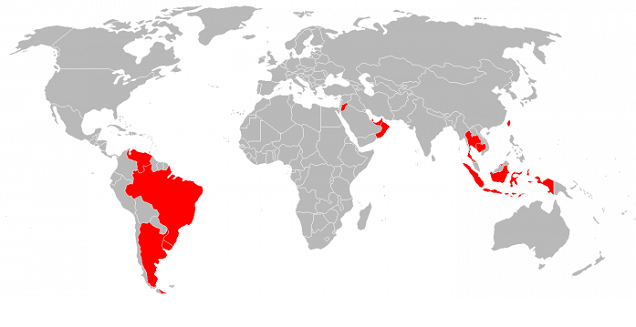
Countries around the world are still grappling with what to do about e-cigarettes. Most are content with regulation – usually disproportionate to the likely risks of vaping – but some take things a lot further, even going so far as to completely ban the sale or even the use of e-cigs. This has been going on for some time, but our old post on e-cigarette bans around the world is now woefully out of date. Since then, some countries have clarified their positions, and others have joined in the excessive, ban-toting anti-vaping crusade, spurred on by the World Health Organization.
So where is vaping banned? Where should you avoid taking your e-cigarette if you’re going on vacation? Where do you at least need to be cautious?
How We Put This List Together
Rules and regulations surrounding vaping are still evolving, and in many cases the situation is very nuanced: with either bans on sale but not possession or outright bans that are flatly ignored. Additionally, there are many countries around the world with e-cigarette policies, but these aren’t always made explicitly clear.
This list will focus specifically on countries with bans on the sale or possession of all e-cigarettes. In some countries, nicotine-containing liquids are specifically banned while nicotine-free ones aren’t, and these have been left off this list. This is because, in general, these countries don’t have an issue with travelers or even citizens importing nicotine-containing liquid for personal use. Australia is a good example of this (although nicotine-containing liquid is completely illegal in Queensland).
Much of the information has been compiled from E-Cigarette Politics’ worldwide e-cigarette laws pages and the Ashtray Blog’s post on traveling with e-cigarettes, but then each has been checked individually to ensure accuracy.
However, there is an issue with bans which are largely ignored, for people on vacation importing e-liquid for personal use or even for citizens, and we will have undoubtedly missed some of the nuance in these cases. Additionally, the legal situation is unclear in many countries, so there may be additional bans we aren’t aware of. If anyone has more information, let us know in the comments!
The List: Countries Where Vaping is Banned and Why

Argentina
Argentina banned the sale and import of e-cigarettes back in 2011. The rationale given for the move is that “there is not enough scientific evidence to determine that these (the e-cigarettes) are safe for human consumption,” which makes the fact that cigarettes are legal hypocritical in the extreme. They also cite World Health Organization recommendations stating that there is no proof e-cigarettes are safe or that they help smokers quit.
However, a commenter on the Ashtray Blog post did say that importation for personal use is OK, but this is far from a clear recommendation, and there may still be problems.
Brazil
Brazil banned the manufacture and sale of e-cigarettes in June 2014 (although other sources say this happened in 2009 – Google Translated from Portuguese, and there’s an old E-Cigarette Forum thread about it here), with officials citing the presence of carcinogens and the FDA’s study as the rationale for the move. The more recent story says there is a fine of 10 reals (around $2.60) for each product confiscated.
Again, the Ashtray Blog’s post points out that readers have vaped in Brazil without issues, but you should exercise caution if you plan to visit.
Brunei
Brunei banned the sale of e-cigarettes in 2010 because it’s an “imitation tobacco product,” and the law states that anybody found using an e-cigarette in no smoking areas can be fined $300 for the first offense and $500 for subsequent offenses. Anyone caught selling or importing can be issued with a fine of $5,000 for the first offense and up to $10,000 for subsequent offenses. The ban is apparently in place because e-cigarettes contain nicotine and carcinogens – as usual, this logic hasn’t been applied to cigarettes.
The rule is in place under the 2005 Tobacco Order, but it’s unclear what the rules are for personal use. It appears it isn’t specifically outlawed, but this isn’t definitive.
Cambodia
Cambodia banned e-cigarettes in 2014, apparently as a result of some testing conducted which found that they “contained a high level of nicotine that could cause a more serious impact on health than cigarettes.” The conclusion drawn from this testing is obviously wrong, but the WHO’s cautious stance may have had a role to play too.
The result is that there is something of a black market for vaping gear in Cambodia, and commenters on the Ashtray Blog’s post reported no problem getting through customs.
Indonesia (Proposed)
Although both E-Cigarette Politics and the Ashtray Blog class e-cigs as banned in Indonesia – with the Ashtray Blog pointing out that the authorities are fine with personal use – recent news stories talk of a proposed ban on sales due to come into force sometime soon. There hasn’t been a definitive time-frame given, though, and for now people continue to sell e-cigarettes in Indonesia.
Jordan
Jordan banned the import and sale of e-cigarettes back in 2009, including nicotine-free options. The reason appears to be that there’s “a higher percentage of nicotine” in e-cigarettes, and they cited the WHO’s statement that there’s no evidence that e-cigs are a safe and effective replacement for cigarettes. Since the ban, some people importing e-cigarettes have sent applications to allow them to proceed, but all applications were summarily rejected.
Oman
Oman banned the sale of e-cigarettes in 2012 (at latest), repeating the same old line that they haven’t been proven safe and effective. Under this rule, the use of e-cigarettes was still allowed, but in September the Ministry of Health said they were considering an outright ban, citing the Center for Environmental Health’s ridiculous formaldehyde “study.”
Qatar
Qatar has banned e-cigarettes both from sale and from import. The rationale given for the sales ban was that “the electronic cigarette is considered more dangerous to the health than normal cigarettes according to the World Health Organization.” Clearly, Qatar received a faulty translation, because nobody made such an absurd statement. The document about import makes it clear that there is also a complete ban on e-cigarettes entering the country.
Singapore
Singapore originally banned the distribution, sale and import of e-cigarettes in 2010, under a law outlawing products “designed to resemble a tobacco product,” with a fine of up to $5,000 for breaking the law. The government has also announced that it will be banning many other emerging tobacco products from December 2015 – with e-liquid specifically described in the legislation – to protect against the “known and potential harms” they pose. Clive Bates and Gerry Stimson wrote a letter to the government explaining why this is ridiculous, given the continued availability of cigarettes.
Taiwan
E-cigarettes were classified as a regulated drug in Taiwan in 2009, which meant that anybody manufacturing, selling or importing e-cigarettes without regulatory approval (which none have, or are likely to get) faces prison sentences and hefty fines. The WHO’s report was cited as justification for the move. The law on products “shaped like cigarettes” covers nicotine-free e-cigarettes, too. However, they are still sold and used illegally, and there have been calls for the government to regulate them as a tobacco product to help control this illegal use.
Thailand
Thailand banned the import of e-cigarettes in 2014, and it appears as though there is a sale ban as well but substantiating evidence of this isn’t easy to find. The situation for people visiting Thailand isn’t so clear-cut, and the Ashtray Blog points out that people haven’t had problems bringing them through customs. It’s worth checking with the airline before you fly, but tourism is an important industry in Thailand so it makes sense that they wouldn’t hassle you for vaping. Additionally, possession of e-cigarettes isn’t illegal in Thailand.
United Arab Emirates
E-cigarettes are banned for both sale and import in the United Arab Emirates (including Dubai), which has been in place since at least 2009. The reasoning is the concern that they’ll undermine anti-smoking efforts and lure young people into addiction, as well as the apparent health hazards. The rule hasn’t prevented illegal trade, and there are claims that the ban may be lifted in favor of regulated sale in the future. Until then, though, taking e-cigs with you to the UAE isn’t a good idea.
Uruguay
Uruguay has completely banned the sale of e-cigarettes, with some pretty silly justifications given: the lack of evidence they work, the presence of nicotine and ethylene glycol being in the liquids (clearly due to the FDA’s analysis). However, the Ashtray Blog’s post points out that readers have vaped in Uruguay without problems, and definitive information isn’t easy to find.
Venezuela
The law in Venezuela is unclear, with one report from 2012 claiming there is a ban for selling and distributing e-cigs (and many other sources saying so), but a WHO document on the country from 2014 claiming that there is no regulation or ban.
Conclusion – Misinformation and Vaping Bans

One thing is clear when looking at the countries who’ve banned vaping and their reasoning: the proliferation of misinformation has a big part to play. While most of these countries use the apparently-reasonable point that “we just don’t know yet,” the intense focus on this rather than what we can reasonably expect based on everything we know so far is misleading, to say the least. Then there are the more blatant examples, such as the claims that e-cigs are actually more dangerous than cigarettes or that they contain more nicotine than cigarettes.
For vapers outside of these countries, knowing about the rules will help you avoid problems when you’re going on vacation, but for smokers in these countries, we can only hope their governments realize just how backwards it is to ban a safer alternative while leaving the more dangerous version on sale.

